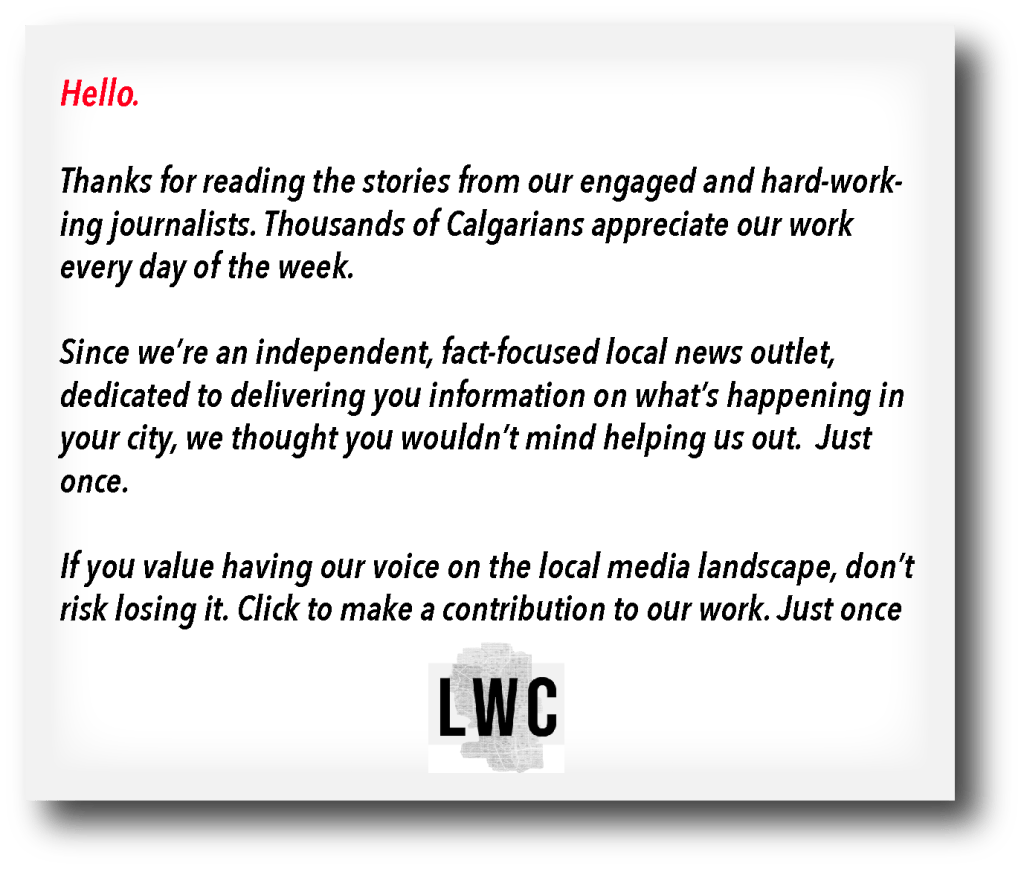Thousands of public submissions have been made ahead of the April 22 public hearing on citywide rezoning, and opposition outnumbers support roughly 10 to 1.
Nearly 700 people have also signed up to present at the public hearing on citywide rezoning, a land use bylaw change that would see large swaths of Calgary’s established area communities upzoned with the hope of stimulating greater density.
The City of Calgary is preparing for the public hearing to last the entire week (including Saturday), with the potential for it to spill over into the following week.
Along with the public presentations, the City of Calgary had collected more than 4,300 unique written submissions, with more than 13,000 pages. (The number doesn’t match the city’s posted number of 5,515 as we only counted serial submitters once.)
A data analysis done by LWC shows that of the submissions, more than 3,800 (3,812) indicated they were opposed. Nearly 400 (399) expressed their support and 136 submissions had a neutral position.
(Data was collated by turning the PDFs submitted by city clerks, using OCR technology, into machine readable text. The data was then checked for accuracy and completeness to ensure that the text used for LWC’s analysis was the same as that which citizens submitted ahead of the April 22 hearings. Textual analysis was then performed on the data using regex)
Mayor Jyoti Gondek is also personally named in 111 submissions, with Ward 14 Coun. Peter Demong a distant second with 32 mentions.
It’s critical to note the data collated cannot be relied upon to be a representative sample of Calgarians’ opinions on the topic. It’s merely a tally of those who felt compelled to submit in advance of the public hearing. It’s also a collection of unique submissions, not necessarily always citizens, but includes organizations that may represent tens, hundreds, or thousands of Calgarians who may or may not have made individual submissions.
The City of Calgary has compiled a detailed look at the public hearing logistics. You can visit their PSA here. We've included additional details on the process below.
Public hearing on public hearings
There’s a growing body of evidence on the impact, or lack thereof, of small-scale rezoning in cities across the globe. Less so on the type of broad-based change being proposed in Calgary. The result, positive or negative – or negligible – is dependent on factors beyond the actual rezoning of a single parcel of land.
In Calgary, most established areas are zoned RC-1, which allows for a single-detached unit (and in most cases the ability to have a secondary suite). Currently, to redevelop those lots and add density, an applicant must go through a land-use designation (to something like R-CG).
(This can already happen on nearly any residential parcel in the city of Calgary. Nearly any parcel. That means regardless of the decision after the rezoning public hearing, anyone can still move forward on increased density on a plot of land, at any time.)
With that land use redesignation, first heard at the Calgary Planning Commission, comes a public hearing. In an overwhelming majority of cases, the land use redesignation is approved (LWC did a data dive on that, too) at Calgary city council.
For anyone who has attended a land use redesignation public hearing, much of the opposition is related to the actual built-form being proposed – not on the land use redesignation itself. Built-form questions are a matter for the development permit, which may be circulated for input after the land use is approved. Citizens can also take it to the Subdivision Development Appeal Board (SDAB).
This is an aspect Calgary Mayor Jyoti Gondek said is an important distinction. She said there’s still a process for citizens to have input.
“The thing that we're going to be able to do if this rezoning passes, is allow people to weigh in on the built-form because this district will now become discretionary instead of permitted like it is, so people have an opportunity to see what's going to be built next door across the street or down the street,” she said.
“That's something that's not readily available right now.”
This is correct – to a point. Even if the citywide upzoning is approved, and a likely change from administration to make rowhouses, in particular, a discretionary use rather than permitted, only then can citizens have a say on that project. Other built-form like townhouses, duplexes, and single-family detached, are permitted uses. That means as long as they abide by the bylaw, they will be approved.
But, since any parcel can already be upzoned, and 95 per cent of those pass, what’s ultimately being determined through this week’s public hearing is whether there will be a public hearing for future land use redesignations, where, typically, development permit objections are lodged.
Seven-plus days of a public hearing to determine if we’ll have further land use public hearings. That’s it.
Several councillors have said they believe that opportunity for public say at council should be preserved. In a twist of irony, many of those same councillors voted for the plebiscite, which would have eliminated the April 22 public hearing on citywide rezoning.
Expect attempted amendments
Ward 14 Coun. Peter Demong, at a recent town hall meeting, said he expects several amendments to come forward on this policy.
“I believe there’s going to be a number of attempts to amend it in many shapes and ways,” Demong said.
In particular, Demong said that he’d look at amending the bylaw to ensure that the rules don’t allow for both a backyard suite and a secondary suite. He also said he would try something with parking, “but I don’t know if I’ll be successful there.”
Ward 12 Coun. Evan Spencer, who has been out on the doors to talk to citizens about citywide rezoning, also said in his pre-public hearing blog post that he would be open to amendments.
He’s looking at potential amendments around parking. In his ward, where transit service is not a viable option due to service levels, further pressure on parking “would be irresponsible.”
Coun. Spencer is also eyeing up a phased approach to rezoning.
“I am not sure why we wouldn’t choose to phase the approach and focus on neighbourhoods already needing to change while also opening up the possibility of a measured approach with course corrections as The City learns and market factors change,” he wrote in the blog post.
He said that he wants to learn more about how this could potentially be tethered to the Local Area Plan process. Further, he said an important element in this is the result of the City’s Short-Term Rental study. He wants to see housing available for citizens rather than investors “looking to cash in on an overheated rental market.”
The vote against a plebiscite and sending it to a public hearing was 8-6. Presumably, most of the eight are in favour of citywide rezoning (while remaining amenable to persuasion, of course.) How potential amendments land could sway a vote or two to either side.
A quick look at the process:
The public hearing on citywide rezoning begins at 9:30 a.m. on Monday, April 22.
City administration will likely provide a presentation on the item, and any potential tweaks they may suggest given feedback from citizens.
After that, the public hearing begins.
Speakers will be put into panels of five presenters, and each presenter has five minutes to speak. According to the City Clerk’s office, it will follow the new public hearing rules that will have alternating viewpoints between either panels or presenters. Previously, they would have done groups in large blocks of for and against. Citizens will be able to hear how the rezoning bylaw will affect each other.
Councillors may ask presenters questions.
Each day will end at 9:30 p.m. (unless otherwise determined by council) and Calgary city council will observe their regular breaks, as long as it’s not interfering with the completion of a speaker or panel.
That will continue until there are no more speakers. The public hearing will then be closed.
After that, city councillors will be able to ask questions of administration. Amendments will be put forward, debate will ensue.
When there’s no more debate, there will be a vote. Some councillors may want items broken apart and voted on separately. If allowed, councillors would vote on split items on the recommendations, otherwise it would be voted on as a whole.
Decision made.



